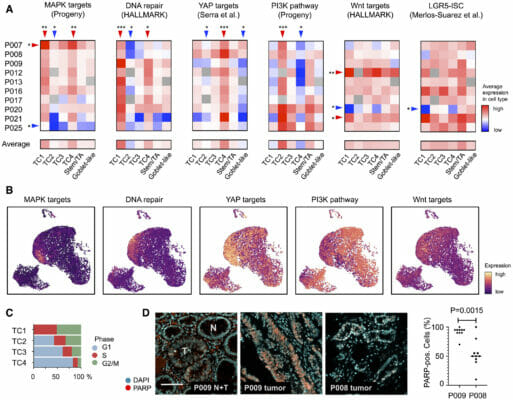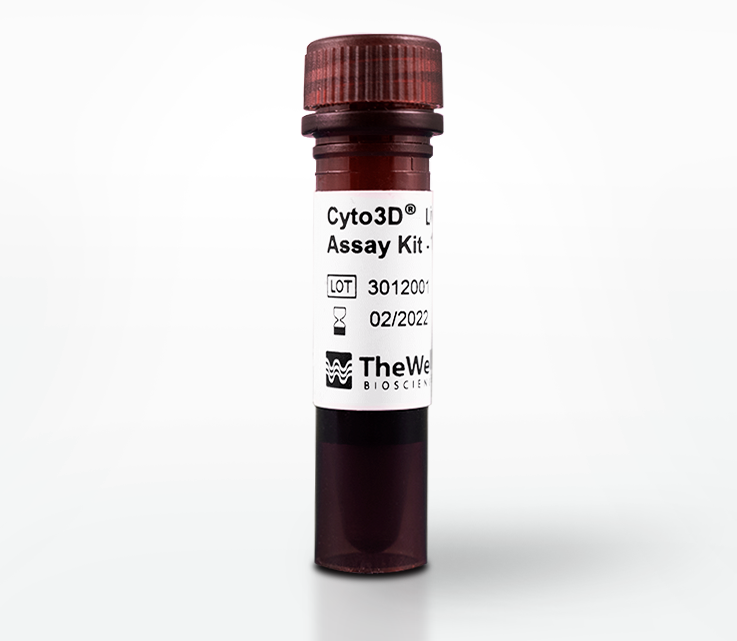Research Highlights
Check the MAP(K): Cancer Driver Signals on Pathway to Change Lanes

Institutions:
Universitätsmedizin Berlin, and the German Cancer Consortium
Team:
Uhlitz F., Bischoff, P., Peidli, S., et al.
Application:
Cancer Research
Disease Model:
Colorectal Cancer
Viability Analysis:
Cyto3D® Live-Dead Assay Kit
Mitogen-activated protein kinases divert the normal developmental path in colorectal cells onto a road to cancer, and distinct RNA signals reveal this change.
The sequence of events that sends normal cells down the road to becoming––and staying––cancerous is not entirely understood. In some instances, key checkpoints appear to be altered or missed in tumorigenesis, resulting in an organized hierarchy of cell control systems being turned into chaos, with uncontrolled cell growth. The advent of colorectal cancer (CRC) has been one of these poorly elucidated situations for which a more complete description of which genes are turned on and which are suppressed would be greatly beneficial in designing potential therapies.
In CRC, it has been appreciated that mutations in the Wnt signaling pathway can often be the culprit. Wnt is a highly evolutionarily conserved pathway that regulates key steps in determining cell fate during embryonic development. But, while there has been suspicion that mutations in this pathway trigger certain protein kinases, the exact molecular mechanisms are unknown, and there may be significant person-to-person variation in these events.
In this study, organized and undertaken by a large collaborative effort between several cancer centers in Germany, twelve patients with colorectal cancer had full single-cell transcriptome analyses performed on both their cancerous and non-cancerous cells. The goal was to determine whether among patient or within patient gene expression variability could uncover some key markers for CRC tumorigenesis and lead to putative therapeutic targets.
Organoids, artificially grown masses of cells or tissue that resemble an organ, were taken from various tissues in each patient and cultured. The viability of each organoid after six days in culture was assayed with the Cyto3D® Live-Dead Assay Kit (cat. no. BM01) from TheWell Bioscience. Viable cells could be treated with various culturing conditions (including drugs) and subjected to complete single-cell RNA transcriptome analysis.
The authors of the study found that the patterns of RNA expression I CRC could be traced back to developmental trajectories that were determined by gradients of mitogen-activated protein kinases. Mitogens are small proteins, even peptides, that trigger or accelerate cell division. In particular, a specific set of proteins in the MAPK-related pathway appeared to play an outsized role in pushing cells toward becoming cancerous. The MAPK pathway, also called the Ras-Raf-MEK-ERK pathway, is a succession of cellular proteins that communicate signals from cell surface receptors to the genome. Normal cells, on the other hand, were more clearly dependent on the “traditional” Wnt-directed pathways. When the authors intentionally targeted the MAPK pathway with drugs such as the MEK1/2 inhibitor Selumetinib, they detected indicative responses in that some cells could revert to undifferentiated states, giving them cancerous potential. This confirmed the role of the MAPK pathway in orchestrating the road to CRC. These data can explain why certain colorectal cancer patients do not respond to therapy, and they also portend future avenues for new and improved therapeutic strategies.


